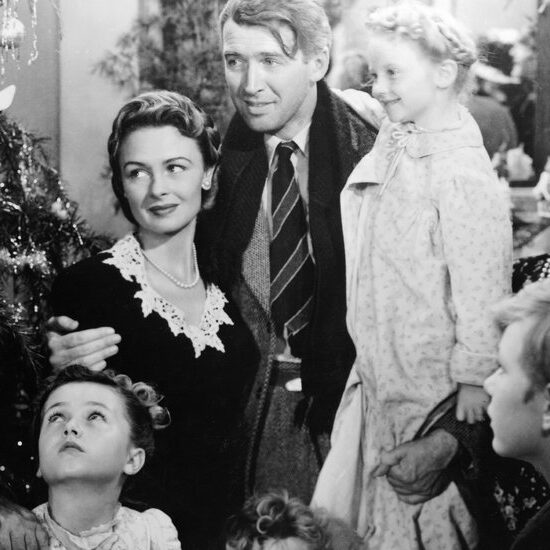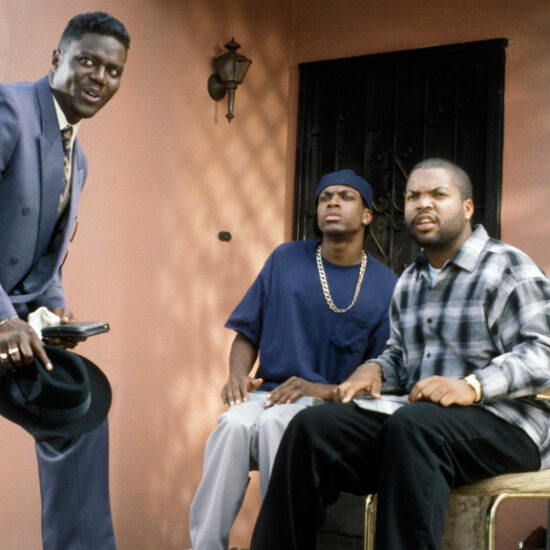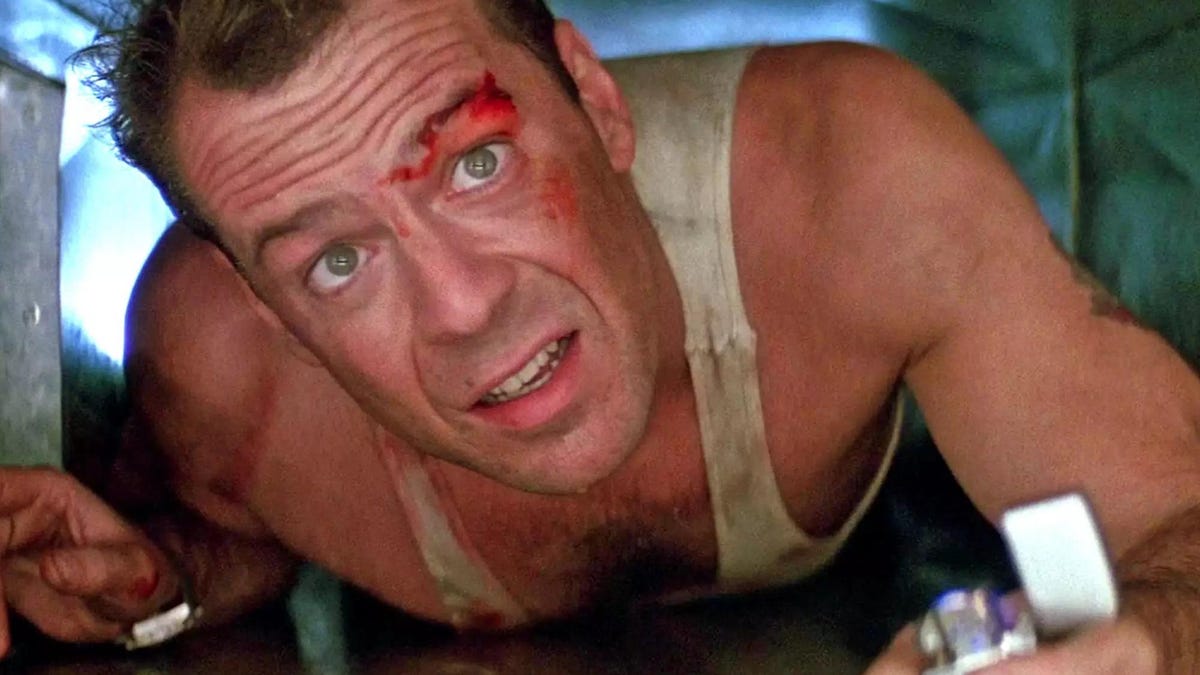
When Die Hard hit theaters 35 years ago, it was like Christmas in July. The action classic, directed by John McTiernan and starring Bruce Willis, established a new standard for popcorn blockbusters when it opened wide on July 22, 1988. Willis’ leading man status was forever cemented in his role as New York City detective John McClane, the underdog everyman pitted against thieves who take over an L.A. high-rise on one incendiary Christmas Eve.
Die Hard spawned a franchise, but the first movie still stands as a monument to Hollywood’s heyday of director-driven, star-powered attractions—and with its yuletide setting, it remains an unexpected holiday favorite. For Die Hard screenwriter Jeb Stuart, the secret of the film’s evergreen appeal is in both its craftsmanship and its heart. Take away the guns, exploding rooftops, and profane cowboy catchphrases, and Die Hard is about a husband who wants to make up with his wife. “It’s about a 30-year-old guy who should have said something to his wife before something really bad happens,” Stuart told A.V. Club in a recent phone interview. “It’s a family story.”
A novel approach to a movie adaptation
Officially an adaptation of Roderick Thorp’s 1979 noir novel Nothing Lasts Forever, Die Hard follows roughly the same plot with a few key differences. In the book, sixty-something protagonist John Leland must save his grown daughter Stephanie, an oil executive, from terrorists who seek vengeance against her employers. Spoilers: Stephanie falls to her death, and the book’s ending implies Leland also dies from his various wounds.
Die Hard was born out of Fox’s rights to Thorp’s book, which were in place before Thorp even wrote it. Stuart was an up-and-coming screenwriter with both a project at Columbia and a four-picture deal at Disney. Neither was bringing in enough income for Stuart to support his wife and two children. With a six-week period to fill with work, Stuart’s agent put him in contact with Lloyd Levin, a producer at 20th Century Fox, who hired Stuart to adapt Nothing Lasts Forever. “I would have taken the Dead Sea Scrolls if they offered it to me,” Stuart jokes.
Stuart liked Thorp’s book, but found it too grim to faithfully turn into a Hollywood movie. In the weeks he had to finish a draft, he struggled to crack the story, straining to reconcile the visceral nihilism of Thorp’s book with the demands of a summer crowd-pleaser. The effort took a toll on Stuart and his marriage. “I was burning the candle at both ends,” Stuart says. “I was working on the Columbia project from 8 [a.m.] until 6 [p.m.]. I’d come home, put my kids to bed, have dinner with my wife, and go back to Burbank at whatever hour [to write Die Hard].”
An inspiration that almost killed him
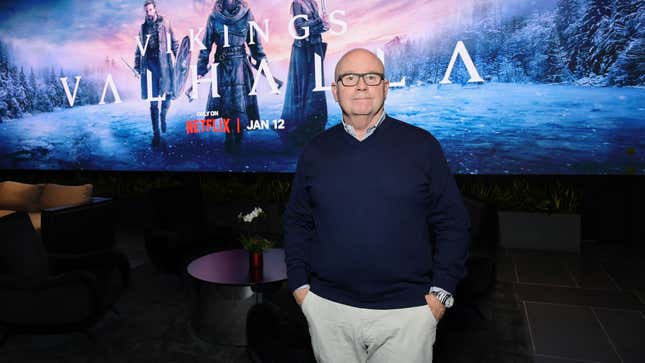
One night, Stuart got into a fight over a trivial matter with his wife, the late Anne Bryant Stuart, who supported her husband through grad school and his dream of becoming a screenwriter. Stuart knew she was “completely in the right,” but his pride still had him storm off and drive down L.A’s Ventura Freeway. “It didn’t take me five minutes to go, ‘She’s right, and I’m wrong.’”
Before Stuart could turn around, he saw the cars ahead of him violently swerving. “There was a Frigidaire box, and I went over it at 65 miles an hour,” he says. Mercifully, it was empty. But with his heart racing, he pulled over on the freeway and saw the Century City skyline—where Nakatomi Plaza would stand—glistening in the distance.
“I suddenly knew what Nothing Lasts Forever was,” he says. The protagonist doesn’t lose his daughter—he has to save his wife. That night, Stuart typed through 30 pages. “Once that was in place, it was easy to take what Thorp had in the novel and build it out.” Ironically, this kept him from doing what actually had to be done: apologize to his wife. “I made the mistake of not calling as soon as I got to the studio,” he says. “She was angry.”
Stuart believes this point of view underscores everything about Die Hard. McClane is only driven to stop Alan Rickman’s Hans Gruber because he just wants to talk to his wife, Holly (Bonnie Bedelia), one more time. “I always saw John McClane and [his wife] Holly as a very personal thing,” he says. It’s also why he sides with audiences who champion it as a Christmas movie. “Ever since I pulled over on [the freeway, Die Hard was] a family story. It’s that idea of bringing the family together for the holidays,” he says. “I wanted everybody to be okay in the end and off to new beginnings.”
(Stuart recalls Fox producer Lloyd Levin wanted Die Hard to end with snow, California climate be damned. Stuart stopped short of writing snow into the movie, but he still granted Levin his holiday wish. The torn-up bonds and office papers floating down Nakatomi, he says, “is L.A. snow.”)
‘Don’t hire the guy that just won the Oscar’
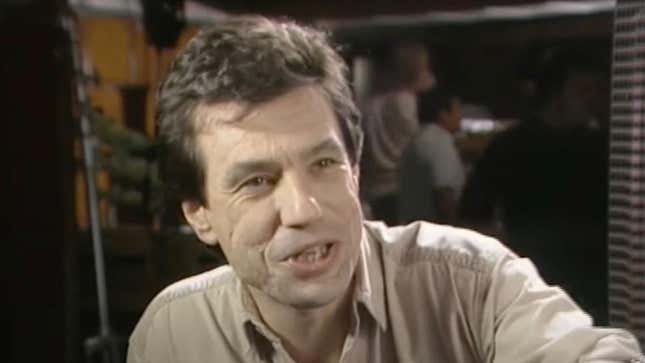
Stuart doesn’t take all the credit for Die Hard. After he submitted his draft and started work elsewhere, writer Stephen de Souza came aboard for rewrites. Bruce Willis was cast after an exhausting process that first courted actors like Clint Eastwood (who, Stuart says, didn’t understand its humor). Willis knew he was no one’s first choice, but he wanted to prove he was the right choice.
Similarly, John McTiernan was fresh from Predator and wanted to prove he could direct the hell out of a movie sans aliens shooting lasers. “McTiernan was enormously hungry,” Stuart says. “He had done Predator, but felt the effects got all the credit. He wanted to do a movie where the director [got the credit]. Everybody brought on wanted to kick the doors down. That’s how you get successful movies. Don’t hire the guy that just won the Oscar, you want the guy dying for it.”
Adds Stuart, “I love working with people who aren’t just punching the clock. No one was punching the clock on Die Hard.”
Thirty-five years later, Die Hard is still the gift that keeps on giving. It explodes like the 4th of July while radiating the warmth of a Christmas spectacular. For Stuart, it is a reminder of his first wife, and the importance of opening up to those you love in the time you have left. “That’s why the origin story [of Die Hard] means so much to me,” he says. “Die Hard wouldn’t be Die Hard without a refrigerator box on the freeway.”









